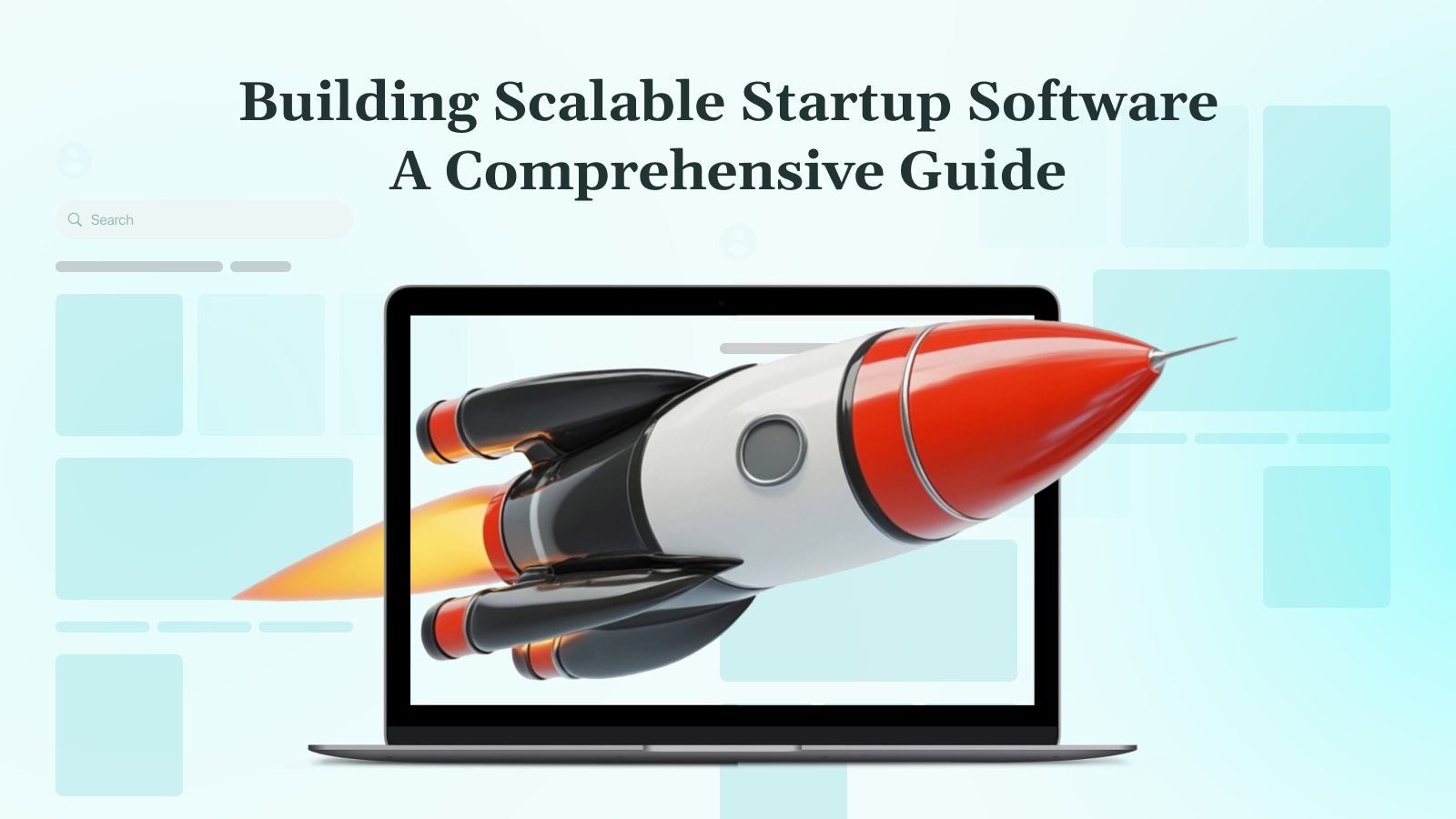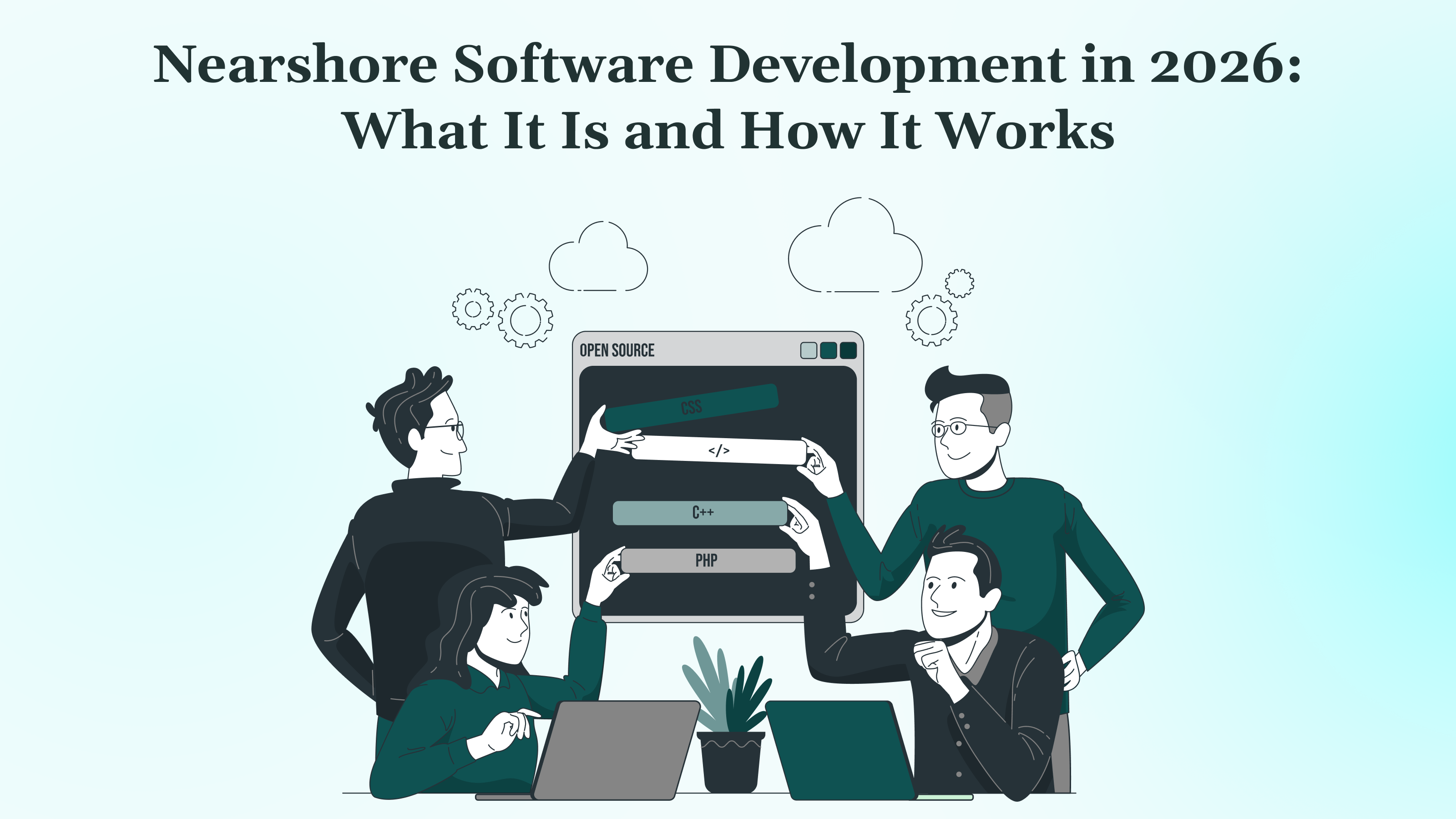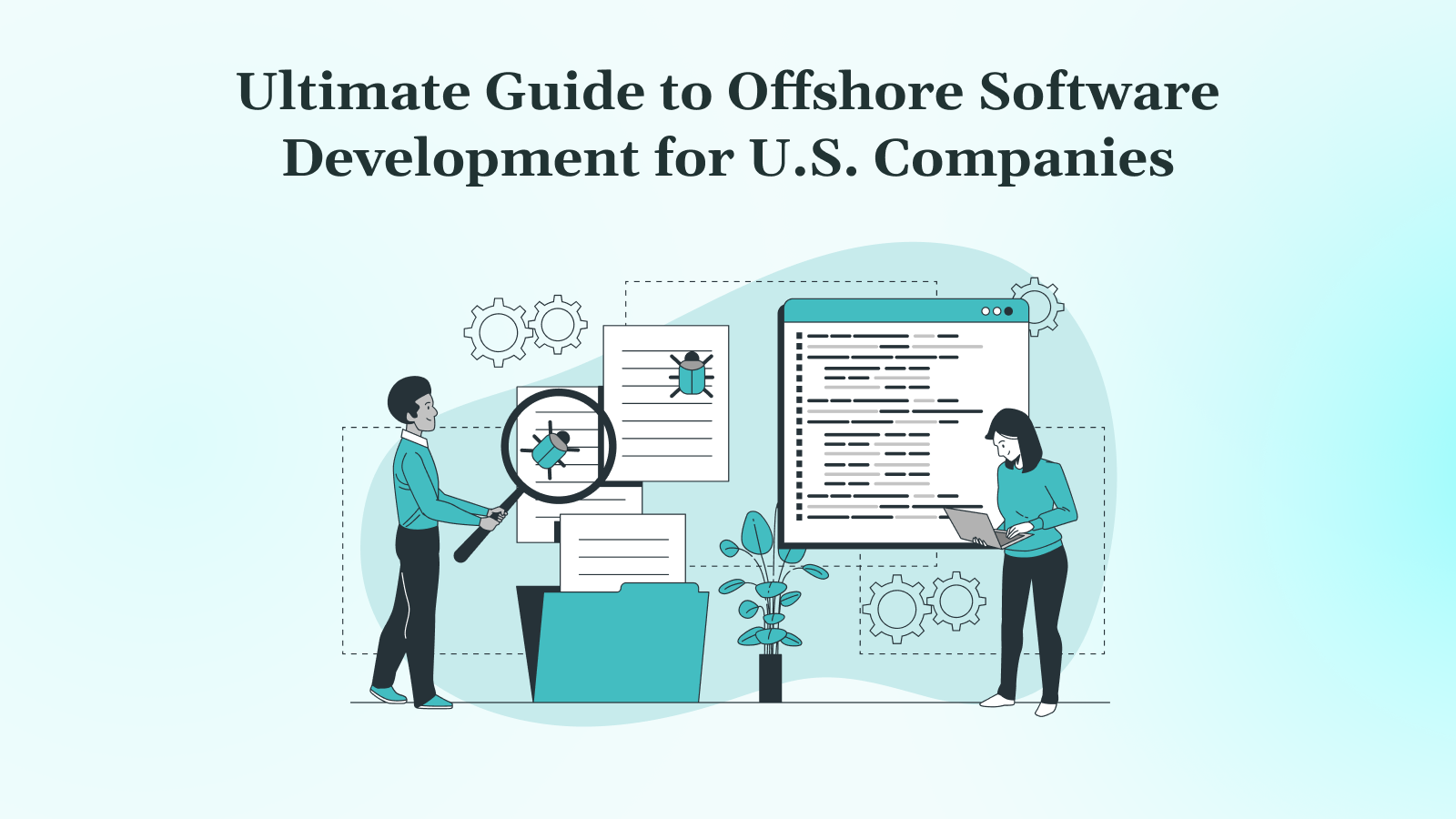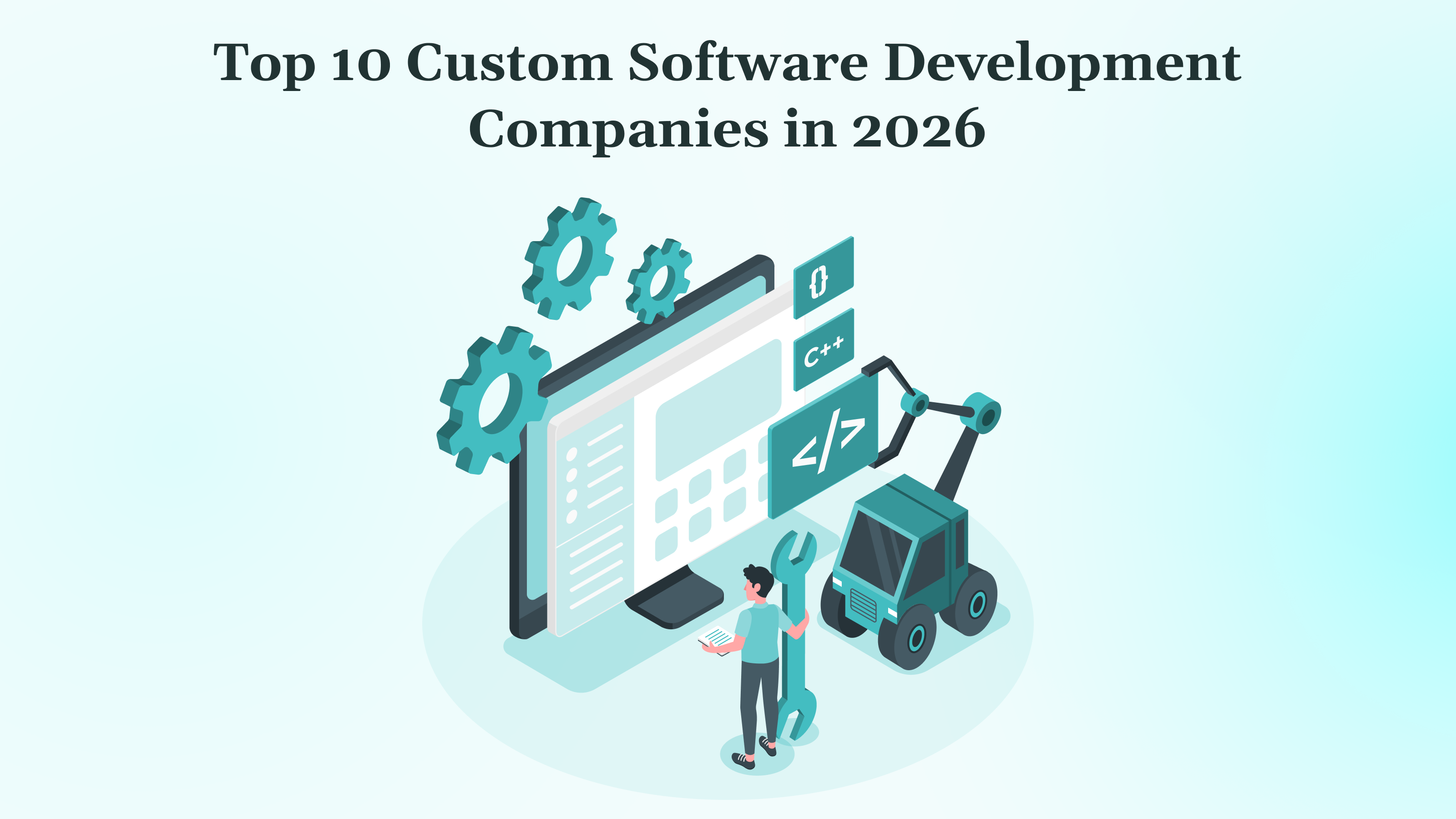Startups face a unique challenge: building reliable software fast while staying lean. In 2025, success today means shipping an MVP quickly, validating it with real users, and iterating fast, all without draining resources.
A smart approach in software development can bridge technical gaps, speed your path to market, and help secure investment. This guide walks you through why startups should consider outsourcing development, how to pick the right methodology, and how to manage the process step-by-step.
You will also find tools to choose trusted partners and avoid common pitfalls, all designed to help your startup scale with confidence. Let us begin by understanding why startups may require outsourced software development in the first place.
Key Takeaways
- Startups can overcome technical gaps, budget limitations, and speed up product delivery by outsourcing development to experienced firms.
- Lean, Scrum, Kanban, and FDD offer different advantages depending on the startup’s needs, from fast iteration to structured delivery.
- Startups need services like UX/UI design, prototyping, QA, and technology consulting to build scalable, high-quality software.
- Prioritize a development partner (like DEVtrust) with domain expertise, strong technical skills, and clear communication to ensure alignment with your startup’s goals.
Why Do Startups Need An Outsourced Software Development Path?
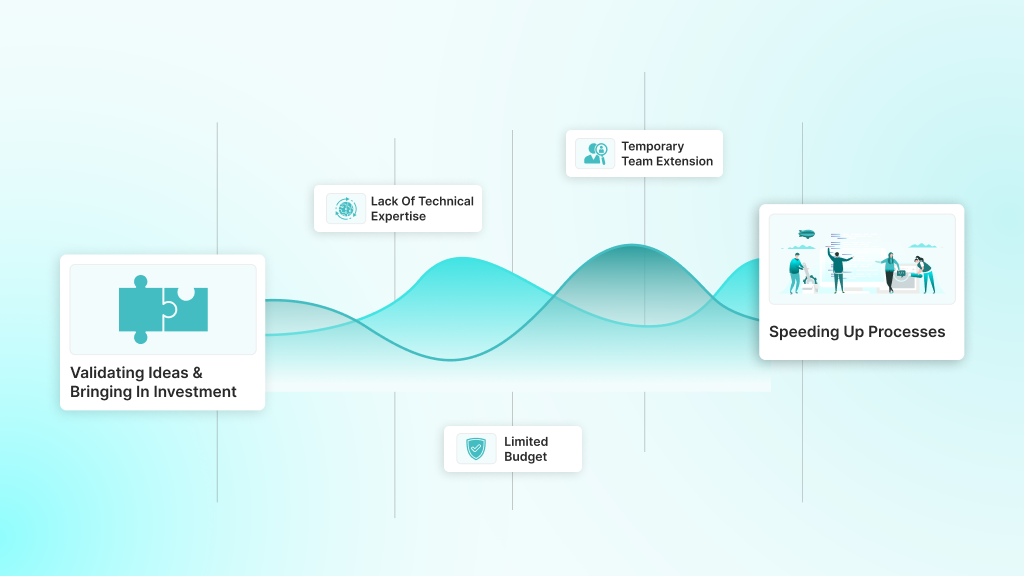
Startup founders face multiple pressures: validating ideas quickly, delivering products, managing tight budgets, and understanding technical gaps. Outsourcing software development addresses these challenges head-on. It provides flexible, scalable capability while letting core teams focus on strategy and growth.
1. Validating Ideas & Bringing In Investment
Startups often need to test their concepts before seeking funding. Outsourcing enables you to produce prototypes or MVPs rapidly. This means you can show working demos to investors or early users sooner. You can iterate based on real feedback, not assumptions.
Outsourced partners bring execution experience that bridges the idea to the product. This quick pace can be the difference between attracting early investment and losing momentum.
2. Lack Of Technical Expertise
A lot of software development for startups may begin with a strong vision but limited technical depth. Building complex systems like cloud infrastructure, secure APIs, and scalable mobile apps can exceed the in‑house team’s capacity. Outsourcing gives access to seasoned developers and architects.
They know best practices and build robust, well‑structured code. This capability helps avoid pitfalls, accelerates onboarding, and elevates product quality from day one.
3. Limited Budget
Startups rarely have deep technical hiring budgets. Salaries, benefits, and infrastructure drain funds fast. Outsourced software development converts these fixed costs into variable ones. You pay only for the work you need. There’s no need for long-term overhead or idle staff.
Outsourcing providers often operate in cost-effective regions, allowing you to get high-quality services at a lower total cost. That financial flexibility lets you extend your runway.
4. Temporary Team Extension
Startups frequently face bursts of work. Perhaps you have reached product-market fit and now need a sprint to scale, or you require specialized skills for a short-term initiative. Full-time hiring can be heavy-handed for that. Outsourcing enables quick, temporary team augmentation.
You plug in experts like UX designers, QA engineers, and DevOps professionals only when needed. This staffing on demand keeps internal teams lean and responsive.
5. Speeding Up Processes
Time is a startup’s most precious asset. Every day counts. Outsourcing firms operate with refined development processes such as Agile, CI/CD, modular architecture, and clear workflows so they move fast without sacrificing quality.
They avoid onboarding delays. They already have team co-operation. That structured pace accelerates product delivery. Combined with your startup’s strategic focus, this speed lets you outpace competitors in the early stages.
Through outsourcing, startups gain velocity, technical depth, and budget control. These strengths turn early-stage ideas into solid, scalable products without distracting leadership from growth, strategy, or customer focus. When starting out, startups must choose the right software development methodology.
Choosing The Right Software Development Methodology For Startups
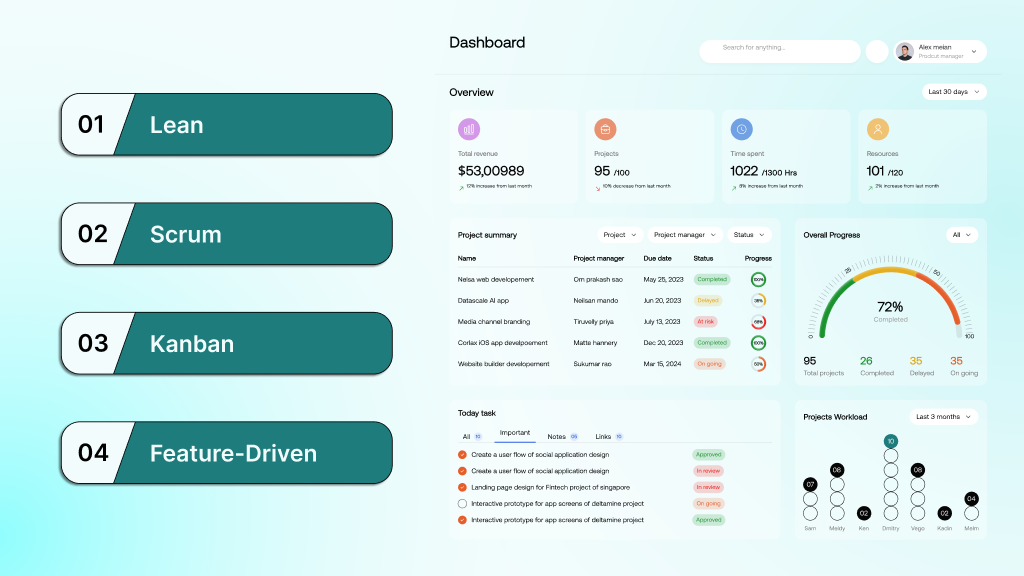
Startups thrive on fast feedback, lean teams, and rapid iteration. Picking the right development methodology helps you operate with clarity, pace, and structure. Below, we break down four proven approaches and their relative strengths for startup environments.
1. Lean
Lean focuses on eliminating waste and delivering value, fast. It centers on building small, testable increments and learning quickly from real users.
Decisions are made late, based on actual feedback, not assumptions. It emphasizes team empowerment, just‑in‑time planning, and continuous improvement. It is, thus, a great fit for early-stage product development.
- Eliminates waste in the process and feature scope.
- Encourages just‑in‑time decisions and minimal upfront planning.
- Emphasizes small, frequent deliveries and learning loops.
Lean works well for startups aiming to validate ideas without over-investing in unnecessary features. It is ideal when you need a customer-focused, adaptable development process that respects budget and speed.
2. Scrum
Scrum provides a structured, sprint-based framework to manage complex product development. It defines roles like Product Owner and Scrum Master, regular ceremonies, and fixed-time sprints.
It ensures discipline and visibility, helping teams align on priorities and deliver incremental value. It suits teams ready for formalized planning and iterative delivery.
- Iterative sprints with clear roles and ceremonies.
- Regular planning, daily stand-ups, reviews, and retrospectives.
- High involvement of stakeholders and process transparency.
Scrum fits startups with changing requirements and a need for predictable cadences. It is useful when you want clarity, frequent feedback, and team accountability within fixed time-boxes.
3. Kanban
Kanban emphasizes visual workflow and continuous delivery. It uses boards to map tasks and limits work in progress to avoid bottlenecks.
It has no fixed sprints or strict roles. Instead, work is pulled as capacity allows. It provides flexibility and clear flow in software development for startups with variable size or priority, making it lightweight and easy to adopt.
- Visual boards and WIP limits to manage flow.
- Continuous, as-needed task delivery without sprints.
- High transparency and adaptability to changing priorities.
Kanban is ideal for startups managing ongoing workflows or support tasks, or when priorities shift rapidly. It is minimal in ceremony and effective for flexible or small teams.
4. Feature-Driven Development (FDD)
FDD is a structured, feature-centric methodology built around designing and delivering client-valued features. It breaks down the product into discrete features, plans them, and implements them in short cycles.
FDD includes domain modeling, feature teams, and detailed progress tracking. It offers predictability and clarity in larger contexts or when feature scope matters.
- Builds software by small, client-valued feature sets.
- Formal roles like feature teams and class ownership.
- Milestone tracking for each feature and consistent progress reporting.
FDD suits startups scaling toward larger systems or enterprise-grade products. It helps maintain structure when the project complexity increases and clear feature ownership is needed.
These four methodologies offer distinct advantages for startups at different growth stages. Lean delivers fast validation. Scrum provides structure and stakeholder clarity. Kanban offers flexibility and flow, and FDD supports disciplined delivery as complexity grows. Moving on, startups must map their software development process well.
Mapping The Startup Software Development Process: Step‑wise Cost Breakdown
Breaking software development into clear steps helps startups plan budgets and anticipate investment at each phase. Below you will find a structured process with detailed explanations for each step. At the end, we provide a sample cost breakdown based on a $100,000 project to guide your planning.
1. Requirements & Discovery
This initial phase defines what you are building and why. It includes workshops, user interviews, competitive analysis, and refining product goals. A clear understanding here prevents misdirection later. It is where your vision becomes actionable.
2. UX/UI & Prototyping
Designers, take your requirements and create wireframes and prototypes. This step focuses on user flows and interface layouts. It is crucial to validate usability before investing in code. Iterating here saves time and rework later.
3. Architecture & Tech Planning
Here, you decide on the tech stack, systems architecture, data flow, and integrations. You map out high‑level modules and define APIs. This foundational work ensures the product scales and runs reliably.
4. Core Development (MVP Build)
Developers build the minimum viable product with essential features. They write front-end, back-end, and connect systems. This phase delivers tangible value and prepares the groundwork for user feedback and iteration.
5. Quality Assurance & Testing
QA engineers test functionality, performance, and security. They perform unit, integration, and user acceptance testing. This phase ensures the MVP works as expected and meets user standards before launch.
6. Deployment & Go‑Live
The product is deployed to production. This includes environment setup, data migration, CI/CD pipelines, and releases. Documentation and training ensure smooth adoption and transition to users.
7. Post‑Launch Maintenance & Iteration
Once live, the team monitors performance, fixes bugs, and refines features based on user feedback. This continuous cycle of iteration strengthens the product and adapts it to real-world needs.
For a better understanding, let us assume a $100,000 budget for an e-commerce startup’s software project and see how it breaks down across the steps:
| Step | % | Amount |
| Requirements & Discovery | 10 % | $10,000 |
| UX/UI & Prototyping | 15 % | $15,000 |
| Architecture & Tech Planning | 10 % | $10,000 |
| Core Development (MVP Build) | 40 % | $40,000 |
| Quality Assurance & Testing | 15 % | $15,000 |
| Deployment & Go‑Live | 5 % | $5,000 |
| Post‑Launch Maintenance & Iteration | 5 % | $5,000 |
| Total | 100 % | $100,000 |
This breakdown offers a realistic model for planning your software budget. It highlights where resources are most needed, especially in development and quality assurance.
Adjusting these percentages based on project size, team makeup, or scope changes helps tailor your financial plan. Now, which services are startups usually seeking in software development?
What Are The Common Software Development Services Used By Startups?
Startups rely on a mix of specialized services to bring their product vision to life. This section explores the core offerings from design and prototyping to consulting that drive startup success.
1. UX/UI Design
A well-designed interface goes beyond aesthetics. It shapes user behavior, builds trust, and reduces churn. Early investment in UX/UI saves time and cost by minimizing rework.
Collaboration between designers and developers ensures feasibility and consistency. Designers craft intuitive wireframes and high-fidelity prototypes that guide development and align teams.
2. Prototype Development
Prototyping transforms ideas into clickable flows. It helps test user interactions before code is written. This service enables startups to explore options and gather real feedback quickly. It checks technical feasibility and informs development decisions.
3. End-to-end Solutions
Full-cycle development covers everything from requirements to delivery. It is ideal for startups without in-house teams. Providers craft everything, including backend, frontend, APIs, infrastructure, and DevOps. This approach ensures cohesion and speed throughout the project.
4. Mobile App Development
Launching a mobile app demands platform-specific expertise. Executing native or cross-platform development requires knowledge of iOS/Android best practices.
For startups, a seamless mobile experience is key to user adoption. This service builds the core product channel when mobile presence matters most .
5. Dedicated Teams
When ongoing development is needed, dedicated teams offer continuity. These teams integrate seamlessly into your culture and workflows. They scale flexibly based on demand. This model blends offshore efficiency with long-term project alignment in software development for startups.
6. QA And Testing
Quality assurance ensures a reliable launch. QA engineers create test plans, execute scripts, and log issues. They secure usability, performance, and security standards. Testing prevents user frustration and costly post-launch fixes.
7. Technology Consulting
Consulting services help choose tech stacks and plan execution. For startups without CTOs, this guidance aligns technology choices with business goals. It may include architecture reviews, infrastructure planning, and risk analysis.
8. Architecture Planning
Complex architecture avoids technical debt. Architects design scalable systems using modular patterns and cloud services.
This planning ensures long-term agility and smooth feature expansion. It helps startups build systems that grow with them.
These services combine to form a strong development pipeline. UX/UI and prototyping guide usability, while architecture, consulting, and dedicated teams ensure scalable execution. With QA and mobile expertise, startups can launch with confidence and agility. Let us move on to discover the top software development firms for startups.
Top 6 Software Development Firms for Startups in 2025
In 2025, startups require software development partners that extend beyond mere coding; they need experts who grasp the complexities of scaling a new business. This list covers six standout firms known for their ability to deliver innovative, practical, and tailored solutions.
These companies are capable of helping startups manage the complexities of tech development, ensuring they get the right tools to grow and succeed.
1. DEVtrust
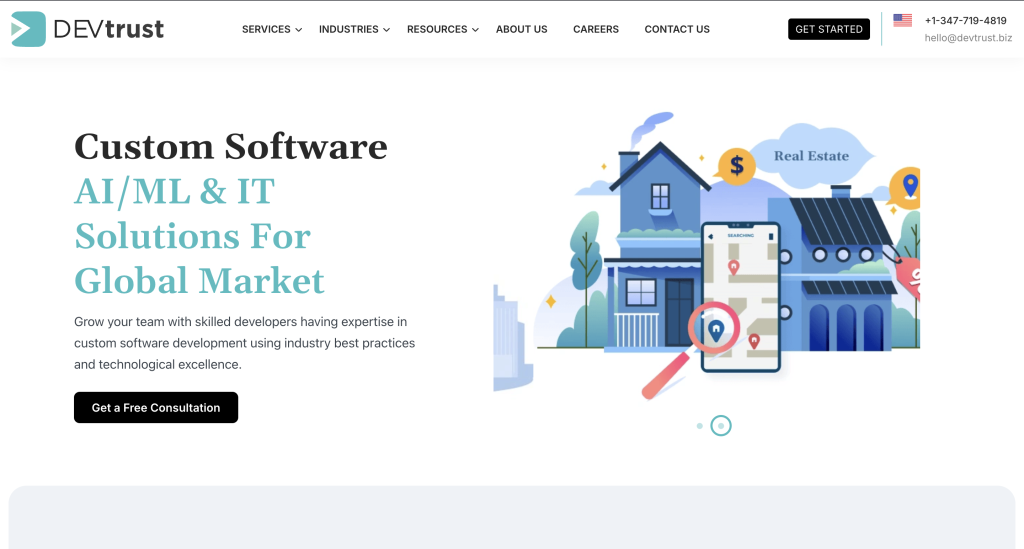
DEVtrust blends a U.S.-based project coordination hub with an offshore delivery center in India. DEVtrust offers full-stack expertise in AI/ML integrations, modern stacks such as React, Node.js, Python, and cloud architecture.
The process includes Agile/Scrum workflows with sprint-based releases and transparent project updates. DEVtrust emphasizes secure development and scalable collaboration during software development for startups.
Key Features:
- U.S. client-facing operations plus offshore execution
- AI/ML & advanced tech integration capabilities
- Agile/Scrum processes with sprint demos and retrospectives
- Focus on security, stable teams, and responsive communication
Ideal for startups looking for a technically capable partner that provides structured governance, real-time communication, and advanced tech capabilities at a cost-efficient rate.
2. SumatoSoft
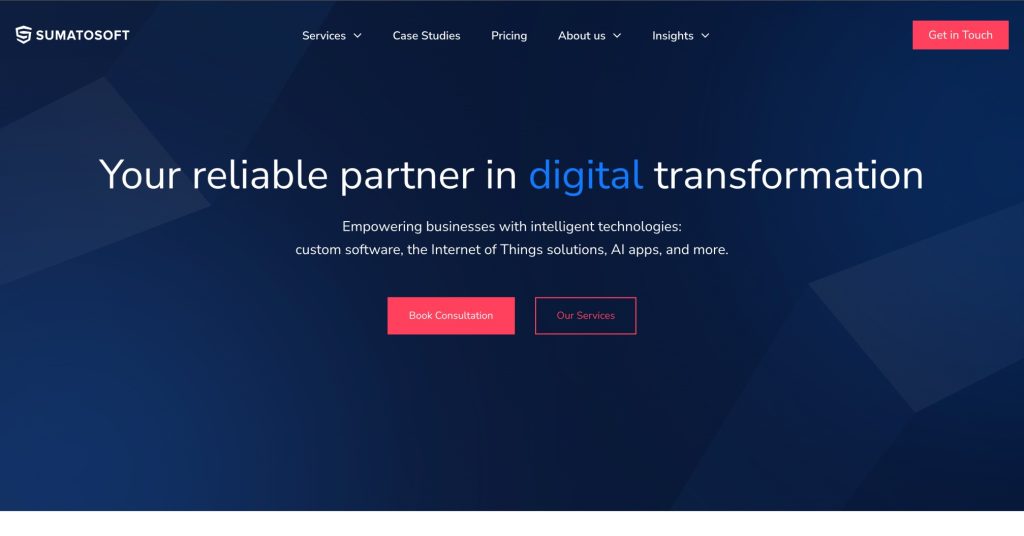
SumatoSoft delivers full-cycle software development to startups and mid-sized businesses. They emphasize transparent workflows, senior-led code reviews, and predictable delivery using Agile.
Their offerings include mobile/web apps, AI, blockchain, and logistics solutions. SumatoSoft positions itself as a trusted digital partner with global clients and post-release support.
Key Features:
- Agile-based transparent development
- Senior oversight with code reviews and quality focus
- Broad domain knowledge: fintech, healthcare, logistics
- Ongoing support after project delivery
Best for startups needing clear workflow visibility, professional oversight, and multi-domain exposure.
3. Dev.family
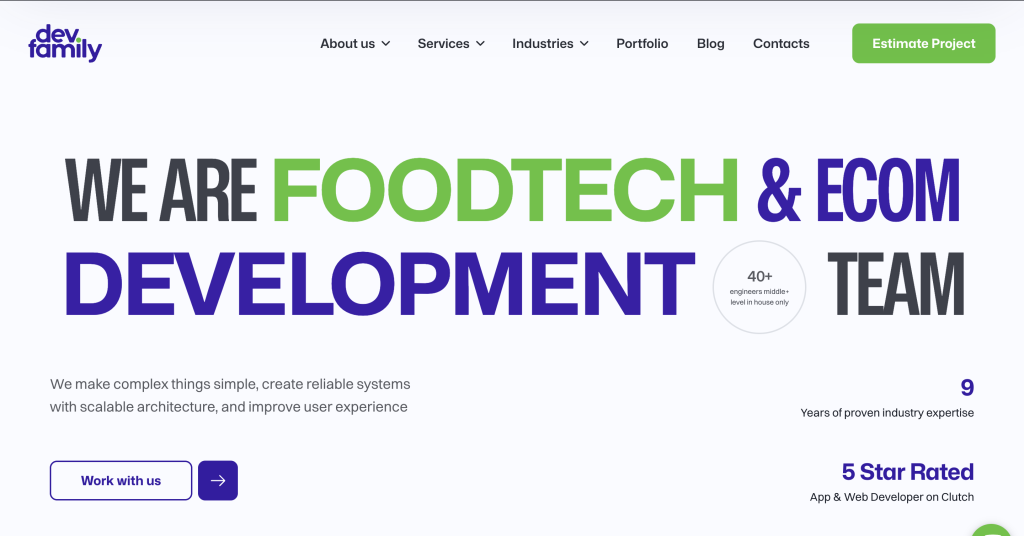
Dev.family works with early‑stage startups, offering lean development processes and flexible team sizes.
They tailor services to startup needs, focusing on rapid iterations, user feedback loops, and cross-platform apps. Their model suits MVP-first strategies where speed and adaptability matter most.
Key Features:
- Startup-first approach with lean delivery
- Rapid MVP-to-iteration cycles
- Cross-platform and scalable stack
- Flexible team structure aligned to startup rhythm
Best suited for early-stage founders who value swift prototyping and continuous adaptation to user feedback.
4. Vention
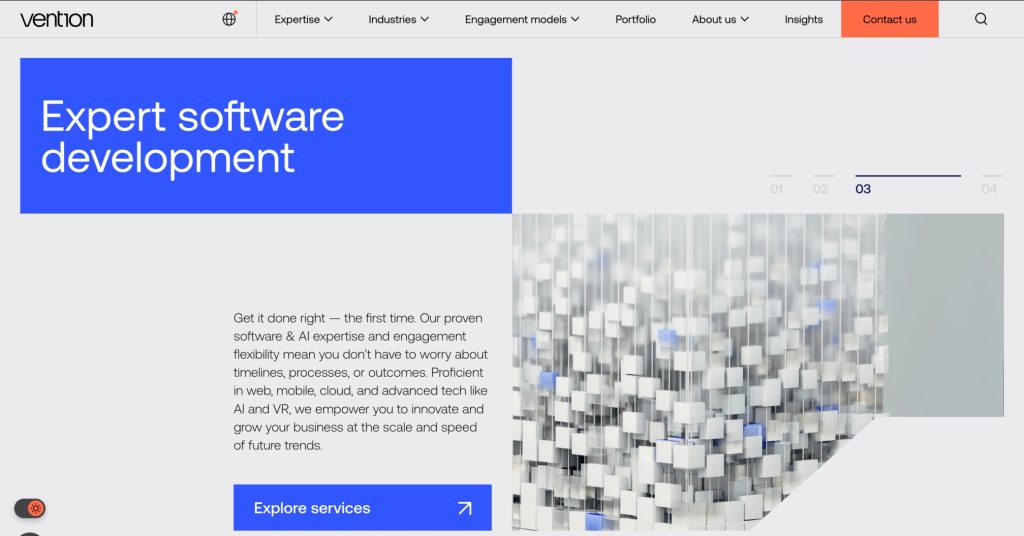
Vention offers automation software and engineering tools, focusing on manufacturing customers.
While not a traditional app development firm, they support startups in the automation and product design space with technical software and robotics platforms. They combine engineering consulting with software delivery.
Key Features:
- Software for automation and robotics integration
- Cross-disciplinary engineering and software support
- A platform with CAD tools and maker modules
- Targeted at industrial-tech and hardware-oriented startups
Most useful for startups developing physical products, automation systems, or robotics tools.
5. Inventiv
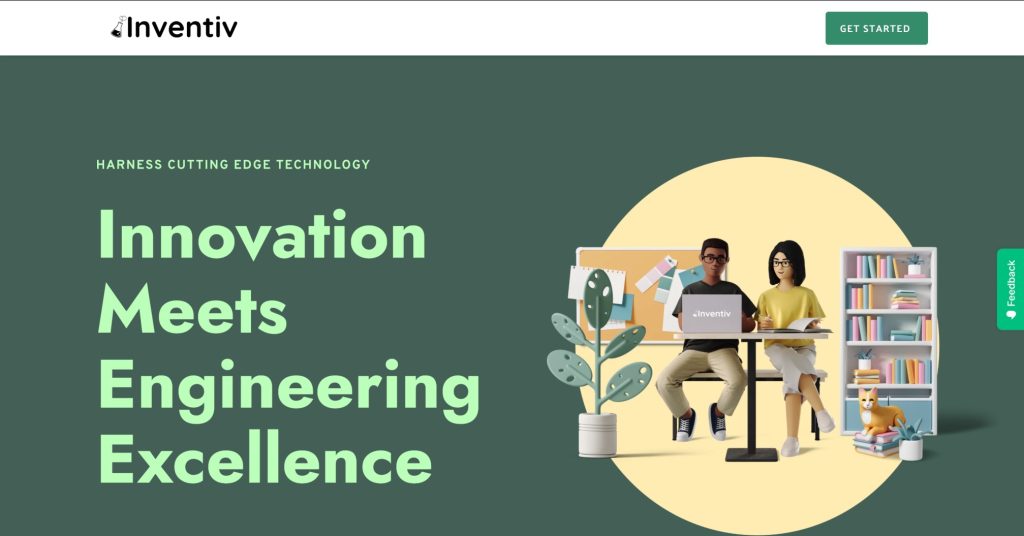
Inventiv is a boutique development provider that supports early-stage startups with prototyping, MVP development, and bespoke features.
They focus on fast team assembly and flexible contracts. Their lean delivery style aligns with startups that need speed and variable scale.
Key Features:
- On-demand small team delivery
- Swift prototyping and MVP support
- Flexible engagement terms
- Emphasis on cost-efficiency and rapid ramp-up
Ideal for startups requiring a compact delivery team with variable scale and a tight budget.
6. Syberry
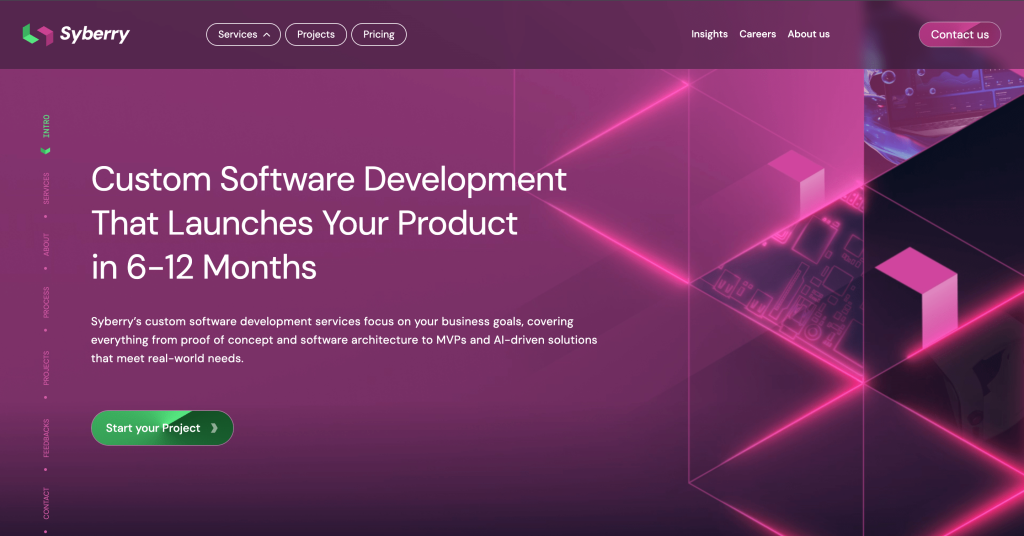
Syberry delivers custom software with a strong focus on desktop, web, and database applications.
They support startups with domain-agnostic applications, delivering reliable architecture planning and QA-driven development. Their structured process suits teams looking for detailed technical oversight.
Key Features:
- Database and enterprise-level app design
- Strong QA/testing methodologies
- Structured architecture and documentation support
- Domain-agnostic delivery capabilities
Best for tech startups needing robust database-backed systems and consistent QA oversight.
Here is a tabular comparison of the given firm’s performance in startup software development:
| Company | U.S. Presence + Indian Delivery | Agile/Scrum Workflow | AI/ML & Modern Stack | Transparent Communication | Post-launch Support |
| DEVtrust | Yes | Yes | Yes | Yes | Yes |
| SumatoSoft | — | Yes | Yes | Yes | Yes |
| Dev.family | — | Yes | Yes | Yes | — |
| Vention | — | — | Yes | — | — |
| Invntiv | — | Yes | — | Yes | — |
| Syberry | — | Yes | — | Yes | Yes |
Why DEVtrust is the most complete option:
It provides a strong U.S.-based client interface with efficient offshore delivery. Its technical breadth covers AI/ML and modern toolchains.
Agile-based process ensures transparency and timely demos. Post-launch support and team stability further strengthen its appeal for startups seeking lasting growth and reliability.
Talking of lasting growth, read about how we helped RankUp Academy with custom dashboard development and data management.
How To Choose The Right Software Development Company For Startups?
Selecting an ideal software partner is a one-time decision that shapes your future in software development for startups. You want a team that aligns with your vision, processes, and goals. Here is a detailed guide to help you make that choice with confidence.
1. Prioritize Domain Expertise
Understanding your industry is vital. A partner familiar with your niche comes with built-in knowledge of common challenges, compliance demands, and user expectations. Reviewing case studies and portfolios helps confirm whether they have tackled similar problems.
That foundation means fewer unknowns when building core features. DEVtrust performs impressively for startups across fintech, healthtech, and e-commerce niches. Read our latest case study for Payvantage, where we helped them through the application process and integration of the Plaid API.
2. Look For Technical Expertise
While domain fit matters, technical match is equally essential. Discuss your stack, like React, Node.js, Django, or mobile frameworks, and see if their developers have real experience with it. Transparency in their process, like sharing code samples or GitHub repos, speaks volumes. A strong technical partnership ensures your startup’s foundation is solid and scalable.
3. Check Company Size & Capacity
You need a partner who neither ignores your project nor treats it like a side note. Mid-sized firms (50–200 people) often strike the right balance: they have enough talent to cover various roles yet remain agile and attentive.
Small teams might lack bandwidth, and large firms might deprioritize startups, so size matters for alignment.
4. Communicate Directly
Efficient communication separates good partnerships from great ones. Ensure your partner encourages direct access to developers and product owners.
Tools like Slack, video meetings, or shared dashboards can smooth collaboration. They should push back thoughtfully and seek clarity on your vision, not just nod along.
By evaluating domain fit, technical strength, company structure, and communication processes, you equip yourself to choose a development partner that scales with your startup’s journey.
Conclusion
Building scalable software for startups in 2025 demands sharp choices at every step: choosing an effective methodology, planning development stages carefully, and partnering with firms that align technically and strategically.
When executed well, startups gain speed, quality, and long-term flexibility. This allows founders to focus on growth while the software evolves.
DEVtrust exemplifies this approach. Their blend of U.S. coordination and offshore execution, modern tech capabilities, transparent Agile framework, and stable team delivery positions them as a partner built for startup success.
If you are ready to build a high-impact MVP, accelerate feature delivery, or scale with confidence, get in touch with DEVtrust today to explore our tailored software services.
Building Scalable Startup Software in 2025: A Comprehensive Guide
Build scalable software development for a startup in 2025 with methodologies, top services, partner tips, and pitfalls to avoid; your roadmap to faster success.
Contact Us